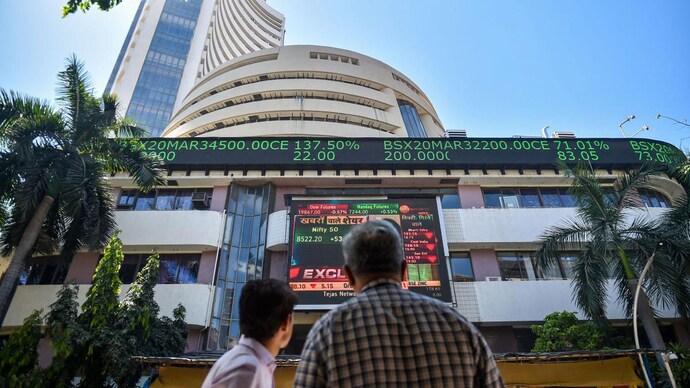Indian Markets Dip as Global Tensions Rise

Indian equity markets opened lower on Wednesday, ending a two-day winning streak amid weak global cues and cautious investor sentiment. The BSE Sensex fell by 165.3 points to 76,569.59, while the NSE Nifty dropped 51.55 points to 23,277. This decline follows a strong start to the trading week, where the Sensex had surged over 1,600 points on Tuesday, closing at a record high of 76,734.02.
Strong Start Followed by Decline
The Indian equity markets had begun the week on a positive note, buoyed by strong global cues and a resurgence of domestic investor confidence. The sharp rise on Tuesday was attributed to optimism surrounding potential easing of U.S. trade hostilities, particularly regarding semiconductor tariffs. Domestic Institutional Investors (DIIs) played a crucial role, remaining net buyers and offsetting outflows from Foreign Institutional Investors (FIIs). Notably, over ₹25,000 crore in Systematic Investment Plan (SIP) contributions during March highlighted steady retail participation despite tight liquidity conditions.
The market’s initial momentum was further supported by U.S. President Donald Trump’s indication that his administration might temporarily ease trade restrictions in the semiconductor and electronics sectors. U.S. customs authorities announced temporary duty exemptions on key consumer and industrial electronics, including semiconductors, providing short-term reassurance to investors. However, Trump also hinted at the possibility of introducing new tariffs in the coming weeks, which has added to market uncertainty.
Global Market Reactions
On the global front, markets have been volatile as investors react to renewed trade tensions between the U.S. and China. Nvidia’s announcement that it would require a U.S. license to ship its latest AI chips to China has negatively impacted investor confidence across Asian markets. Nvidia’s shares fell approximately 6% in after-hours trading, affecting suppliers like TSMC, SK Hynix, and Advantest, which also experienced notable losses.
Broader indices reflected this turmoil, with Hong Kong’s Hang Seng index declining by 1.8%, while Tokyo’s Nikkei and Shanghai Composite both dropped by 0.7%. Despite these challenges, global equities showed some resilience on Tuesday, with the Dow Jones up 0.78%, the Nasdaq gaining 0.64%, and the S&P 500 rising by 0.79%. This was largely due to strong earnings in the banking sector and speculation that the worst of the trade war impacts might be temporarily behind.
Economic Indicators and Future Outlook
Meanwhile, China’s first-quarter GDP growth exceeded expectations, rising by 5.4% year-on-year. However, officials cautioned about “certain pressures” stemming from rising tariffs and a complicated external environment. Analysts noted that much of China’s export strength in March appeared to be “front-loaded” to meet tariff deadlines, raising concerns about the sustainability of this momentum.
As the global economic landscape continues to evolve, investors remain on edge, closely monitoring developments in trade policies and their potential impacts on market stability. The interplay between domestic and international factors will be crucial in shaping the future trajectory of Indian equity markets.
Observer Voice is the one stop site for National, International news, Sports, Editor’s Choice, Art/culture contents, Quotes and much more. We also cover historical contents. Historical contents includes World History, Indian History, and what happened today. The website also covers Entertainment across the India and World.

